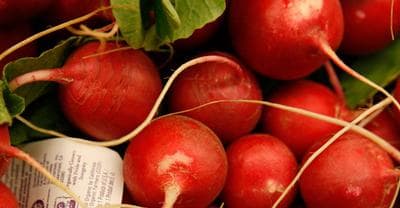Advertisement
Organic Food Under Fire? Not So Fast

The hot button food news this week is that organic fruits, vegetables, and meat may not be all that superior to conventionally grown and raised food. The revelation, from a new report by Stanford University’s Center for Health Policy, was based on a 40 year meta study and a review of 237 research findings
In the end, researchers concluded that organic foods are marginally lower in pesticides, equivalent nutritionally, and a lot more expensive than regular old industrial food.
Boats are being rocked, marketing campaigns are in flux and all sorts of smug Tweeters are saying snotty things about organic over-hype. I think many are missing the point. Organics matter to people because they believe that supporting organic farming is an investment in the future of our food system.
I’ve never believed that organic food was the edible equivalent of the Holy Grail. (For the record, I’m more of an Eat Local, Think Global sort.) Sure, it would be nice if an organic blueberry had more vitamin C. It would be a plus if a pork chop from a pig that had lived a happy, free-range existence had lower levels of chemical residue. But to me the news that our conventional food supply is in comparatively good shape, or at least the roughly the same shape as the organic food system, is reassuring. But nutrition is only one part of the equation.
The interest in organics is part of a larger movement away from food that comes from too far away, is harvested by underpaid workers, and is basically an industrial product rather than the unity of soil, seed, and sun. Organic food is an iconic centerpiece of a whole belief system that demands we recapture the link between food, farmers, and land.
People are passionate about food, and becoming more so every day. American consumers have demonstrated that they are willing to pay a premium for organics. (That’s why bottom-line driven companies like Wal-Mart and Heinz have energetically embraced the movement as a potent consumer driver.) Some are motivated by politics – and will trade only with those who guarantee fair working conditions for their farmers. Others are inspired by fear – having seen perhaps one too many news reports about organophosphate pesticides and the travel patterns of genetically modified seed spores from farm to farm.
Whatever their motivation, supporting organic agriculture helps people feel empowered by their food choices. That’s the real reason organic food matters. It is part of the most powerful social movement of our day: Food Consciousness. And though I have great respect for the fastidious research by the Stanford team, in no way is the new report a devastating blow to organic food.
Ultimately people don’t reach for the misshapen organic strawberry because it has more vitamin C. They do so in the hope that supporting organic agriculture will help raise the conversation and make the food system healthier for all of us in the long run.
This program aired on September 6, 2012. The audio for this program is not available.